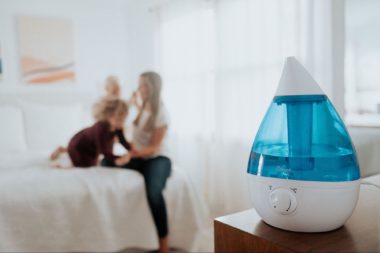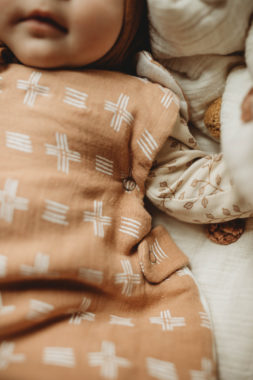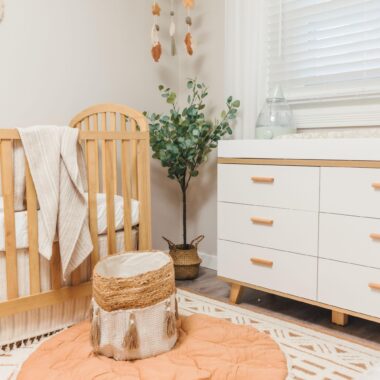It’s inevitable. At some point, your baby is going to get sick. And when they do, you’ll want to be prepared and know how to help a sick baby. Having the necessary supplies on hand will make taking care of your little one a lot easier. The last thing anyone wants is to have to run to the store with a sick baby.

Here are seven essential items to have on hand to manage your baby’s next sickness like a parenting expert.
A Thermometer
This is vital for monitoring your baby’s temperature. A fever can be a sign of a serious infection, so it’s important to keep an eye on things. Thermometers for adults and children differ, so make sure you have the right one on hand. Using one made for adults will often give you a false reading. Baby fevers also vary depending on their size and what kind of thermometer you are using, so be sure to consult your pediatrician. A rectal thermometer is the most accurate, but you can also use an ear or temporal artery thermometer in a pinch.

A Humidifier
If your baby is sick, chances are they’re going to have a stuffy nose. A humidifier will help to keep their nasal passages moist, making it easier for them to breathe. Having a humidifier on hand is a must for any sick baby, but also helps to prevent sickness in the first place. Just be sure to clean it regularly so that it is ready for use when you need it.
When choosing a humidifier, be sure to get one that is the right size for your room. Keeping the humidity between 40 and 60 percent is ideal. You should also consider getting a cool mist humidifier as opposed to a warm mist one, as they are safer for babies and children.
Pediatrician-Approved Pain Reliever
For babies, the most common pain reliever is acetaminophen. Ibuprofen is not recommended for children under six months old. You’ll want to have both a liquid and suppository form on hand in case your baby refuses the medicine. Suppositories are also good to have on hand in case your child is sick and vomiting. Make sure you know the dosage for your baby’s weight and age as well as how often you can give it to them, and always be sure to consult your pediatrician before giving your baby anything.
Medicine Spoons or Nipple Medicine Dispensers
You’ll need some way to measure and dispense your baby’s medicine. A regular kitchen spoon is not accurate enough, and you don’t want to risk giving your baby too much or too little medication. Look for a disposable medicine spoon or nipple medicine dispenser at your local drug store to make things easier.
A Good Nasal Aspirator and Saline
Babies can’t blow their noses, so when they’re congested, it’s up to you to help them out. A good nasal aspirator will help to clear their nose so they can breathe easier. This is especially important at night when you’re wondering how to help a sick baby sleep. A congested baby will often wake up frequently because they can’t breathe well. There are a few different types of nasal aspirators, so find one that works best for you and your baby. The most common type is the bulb syringe, but there are also battery-operated and manual options available.
Using saline is another way to help clear your baby’s nose. The saline will help to thin out the mucus and make it easier to suction out. You can also use saline spray to prevent congestion in the first place by spraying it in their nose before they go to sleep.

Comfortable Clothes
If your baby is sick, they’re going to want to be comfortable. That means loose-fitting clothes that won’t irritate their skin. Cotton is always a good choice as it is soft and breathable. You’ll also want to have a few extra sets of clothes on hand in case they vomit or have any accidents. It’s always better to be safe than sorry when it comes to sick babies. To keep them warm and cozy while they are sick, make sure they have a warm blanket. For young babies, our wearable blanket is a great way to keep them secure and warm, and you don’t have to worry about them kicking it off in the middle of the night.

Baby Safe Disinfectants
When caring for a sick baby, maintaining a supply of baby-safe disinfectants is an important step in creating a clean and healthy environment. Babies have developing immune systems that make them more vulnerable to infections, so keeping surfaces and toys sanitized is paramount.
Opt for disinfectants specifically formulated to be safe around infants, as they are designed to be gentle yet effective. These products are free from fragrances and harsh chemicals that could possibly irritate your baby’s sensitive skin or respiratory system. Regularly disinfect commonly touched surfaces such as changing tables, doorknobs, and crib rails to reduce the risk of spreading germs within your home. By having these baby-safe disinfectants on hand, you’re not only providing your little one with a hygienic space but also promoting a swifter path to recovery.
These are just a few of the essential items you’ll want to have on hand when your baby gets sick. By being prepared, you can take care of them quickly and easily, getting them back to their happy selves in no time.
Do you have any other sick baby essentials? Share them with us in the comments!